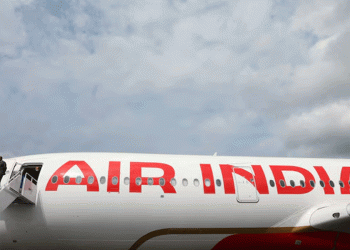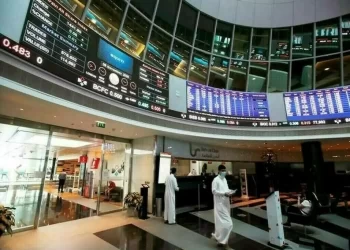KARACHI: Special Assistant to the Prime Minister on Digital Media and Minister of State Fahd Haroon sounded a confident tone when he spoke of Pakistan’s IT sector.
He described it as a key area being prioritised by the government – the other two being agriculture and mining – and placed a great amount of faith in the country’s vibrant youth that, he believes, would usher in the next growth phase for Pakistan’s economic growth.
“Pakistan’s IT sector has immense potential,” Haroon told media in Karachi. “Our freelancers, internet penetration and app development are key highlights.”
In a rare interview, Haroon spoke at length about the country’s potential – a conversation that came on the heels of Pakistan recording its highest IT and IT-enabled services export remittances at $3.22 billion in 2023-24, a massive 24% growth year-on-year.
Now, the plan is to hit a target of $25 billion in the next five years.
“We have immense faith in our youth and are committed to giving them all the tools they need to succeed in IT,” he added.
But his comments could be taken with a pinch of salt. The country’s internet infrastructure almost crumbled last month, and serious questions were raised over Pakistan’s ability to manage the crisis. Contradicting statements did not help the cause and delayed updates also heightened worries in a country where a greater number of professionals have turned towards freelancing after the pandemic and dollar appreciation.
Several business associations and trade bodies criticised the government’s handling of the crisis, and some even said the internet disruption and its slowdown were a result of Islamabad’s move to install a firewall for greater scrutiny of online activity.
Internet services face disruption across Pakistan, PTA blames PTCL
Haroon said these were misconceptions.
“There was a slowdown. But it wasn’t due to any firewall.”
Haroon said that there were technical reasons behind the issue, explaining that out of the seven submarine internet cables Pakistan relies on, two were out of commission.
“One (of the two cables) has been fixed, while work on the other is still ongoing,” Haroon shared, adding that this caused a temporary reduction in speed. He reassured users that “100% speed will be restored soon”.
IT minister dismisses reports govt throttling internet
Haroon pointed out that the outage wasn’t just a Pakistan-specific problem but part of a broader global issue.
“These cable repairing companies are managed by international consortiums with offices in locations like Singapore and Dubai. Repairing these cables is a time-consuming process that requires permissions and collaboration from various countries and companies.”
Haroon drew a comparison with India, pointing out that the neighbouring country relies on over 20 cables for its internet, and it is a drop in the ocean if India loses a cable or two.
“Pakistan, with its limited supply, faces a bigger impact with the same magnitude of loss. But it has been confirmed that the issue will be resolved by October.”
Another key question was the role of what many have dubbed a ‘firewall’ or the Web Management System (WMS) in potentially contributing to the slowdown.
Haroon was quick to dispel these rumors.
“The WMS is not responsible for internet slowdowns. It is a separate system designed to block illegal content like blasphemous material, pornography, and disinformation,” he stated firmly.
Haroon also emphasised the importance of safeguarding Pakistan’s digital frontiers.
“Pakistan has faced over 32 million cyberattacks, with a 300% increase in such incidents between the first quarters of 2023 and 2024. The WMS plays a critical role in preventing these cyberattacks and protecting the economy, reputation, and data of the country,” he added.
The firewall system, according to Haroon, is a necessary tool to prevent illegal and harmful content from being accessed in Pakistan. However, he assured that “the system is not designed to stifle freedom of expression or blackmail platforms. We only enforce these measures when absolutely necessary, such as when national security or cultural norms are at risk.”
To address internet speed issues, Haroon highlighted the importance of upgrading infrastructure and reconfiguring existing systems. He noted that the demand for internet services in Pakistan is growing at great speed.
“We have over 111 million internet users with 45% penetration. However, we face a supply-demand gap, with usage growing by 25% annually,” he said, cautioning that without improvements to the infrastructure, meeting this demand will continue to be a challenge.
Haroon also pointed out that the government is keen to work with local and international stakeholders to enhance the country’s digital infrastructure. “We are constantly engaging with private internet service providers (ISPs) and telecommunications companies to improve our internet speed and access,” he said, adding that the government’s collaboration with the military leadership, including the Prime Minister and the Army Chief, demonstrates a serious commitment to resolving these issues.
Area of growth
One segment within the IT sector that Haroon said has significant growth potential is gaming.
“Pakistan is now on the world radar for gaming. We’ve seen numerous success stories in this area, and the sector has the potential to contribute massively to our economy,” he said.
Pakistan is poised to become one of the fastest growing video games markets. According to the Global Entertainment and Media Outlook 2022–2026 Report, Turkey will be among the fastest growing video games markets between 2021 and 2026 (with a 24.1 %CAGR), followed by Pakistan (21.9%) and India (18.3%).
When asked about recent restrictions on social media platforms like X (formerly Twitter), Haroon clarified the government’s position. He stated that such actions are only taken when national security or cultural norms are at risk.
“We will never allow ourselves to be blackmailed by any platform. If blasphemous content or pornography is present, we have no choice but to take action,” he explained.
Haroon emphasised that the government is open to working with social media companies but will always prioritize national interests. “We reach out to platforms and discuss our concerns, but we also expect them to respect our laws and cultural norms,” he said.
Haroon reaffirmed the government’s commitment to supporting the IT sector and improving internet access in Pakistan. “We are a vibrant, forward-looking nation, and we will continue to take the necessary steps to secure our digital frontier and promote the growth of the IT sector,” he said.
Haroon’s remarks underscore the challenges and opportunities facing Pakistan’s digital landscape. While the recent internet slowdown and curbs on social media have raised concerns, the government remains optimistic about the country’s IT potential and its role in shaping a digital future.
KARACHI: Special Assistant to the Prime Minister on Digital Media and Minister of State Fahd Haroon sounded a confident tone when he spoke of Pakistan’s IT sector.
He described it as a key area being prioritised by the government – the other two being agriculture and mining – and placed a great amount of faith in the country’s vibrant youth that, he believes, would usher in the next growth phase for Pakistan’s economic growth.
“Pakistan’s IT sector has immense potential,” Haroon told media in Karachi. “Our freelancers, internet penetration and app development are key highlights.”
In a rare interview, Haroon spoke at length about the country’s potential – a conversation that came on the heels of Pakistan recording its highest IT and IT-enabled services export remittances at $3.22 billion in 2023-24, a massive 24% growth year-on-year.
Now, the plan is to hit a target of $25 billion in the next five years.
“We have immense faith in our youth and are committed to giving them all the tools they need to succeed in IT,” he added.
But his comments could be taken with a pinch of salt. The country’s internet infrastructure almost crumbled last month, and serious questions were raised over Pakistan’s ability to manage the crisis. Contradicting statements did not help the cause and delayed updates also heightened worries in a country where a greater number of professionals have turned towards freelancing after the pandemic and dollar appreciation.
Several business associations and trade bodies criticised the government’s handling of the crisis, and some even said the internet disruption and its slowdown were a result of Islamabad’s move to install a firewall for greater scrutiny of online activity.
Internet services face disruption across Pakistan, PTA blames PTCL
Haroon said these were misconceptions.
“There was a slowdown. But it wasn’t due to any firewall.”
Haroon said that there were technical reasons behind the issue, explaining that out of the seven submarine internet cables Pakistan relies on, two were out of commission.
“One (of the two cables) has been fixed, while work on the other is still ongoing,” Haroon shared, adding that this caused a temporary reduction in speed. He reassured users that “100% speed will be restored soon”.
IT minister dismisses reports govt throttling internet
Haroon pointed out that the outage wasn’t just a Pakistan-specific problem but part of a broader global issue.
“These cable repairing companies are managed by international consortiums with offices in locations like Singapore and Dubai. Repairing these cables is a time-consuming process that requires permissions and collaboration from various countries and companies.”
Haroon drew a comparison with India, pointing out that the neighbouring country relies on over 20 cables for its internet, and it is a drop in the ocean if India loses a cable or two.
“Pakistan, with its limited supply, faces a bigger impact with the same magnitude of loss. But it has been confirmed that the issue will be resolved by October.”
Another key question was the role of what many have dubbed a ‘firewall’ or the Web Management System (WMS) in potentially contributing to the slowdown.
Haroon was quick to dispel these rumors.
“The WMS is not responsible for internet slowdowns. It is a separate system designed to block illegal content like blasphemous material, pornography, and disinformation,” he stated firmly.
Haroon also emphasised the importance of safeguarding Pakistan’s digital frontiers.
“Pakistan has faced over 32 million cyberattacks, with a 300% increase in such incidents between the first quarters of 2023 and 2024. The WMS plays a critical role in preventing these cyberattacks and protecting the economy, reputation, and data of the country,” he added.
The firewall system, according to Haroon, is a necessary tool to prevent illegal and harmful content from being accessed in Pakistan. However, he assured that “the system is not designed to stifle freedom of expression or blackmail platforms. We only enforce these measures when absolutely necessary, such as when national security or cultural norms are at risk.”
To address internet speed issues, Haroon highlighted the importance of upgrading infrastructure and reconfiguring existing systems. He noted that the demand for internet services in Pakistan is growing at great speed.
“We have over 111 million internet users with 45% penetration. However, we face a supply-demand gap, with usage growing by 25% annually,” he said, cautioning that without improvements to the infrastructure, meeting this demand will continue to be a challenge.
Haroon also pointed out that the government is keen to work with local and international stakeholders to enhance the country’s digital infrastructure. “We are constantly engaging with private internet service providers (ISPs) and telecommunications companies to improve our internet speed and access,” he said, adding that the government’s collaboration with the military leadership, including the Prime Minister and the Army Chief, demonstrates a serious commitment to resolving these issues.
Area of growth
One segment within the IT sector that Haroon said has significant growth potential is gaming.
“Pakistan is now on the world radar for gaming. We’ve seen numerous success stories in this area, and the sector has the potential to contribute massively to our economy,” he said.
Pakistan is poised to become one of the fastest growing video games markets. According to the Global Entertainment and Media Outlook 2022–2026 Report, Turkey will be among the fastest growing video games markets between 2021 and 2026 (with a 24.1 %CAGR), followed by Pakistan (21.9%) and India (18.3%).
When asked about recent restrictions on social media platforms like X (formerly Twitter), Haroon clarified the government’s position. He stated that such actions are only taken when national security or cultural norms are at risk.
“We will never allow ourselves to be blackmailed by any platform. If blasphemous content or pornography is present, we have no choice but to take action,” he explained.
Haroon emphasised that the government is open to working with social media companies but will always prioritize national interests. “We reach out to platforms and discuss our concerns, but we also expect them to respect our laws and cultural norms,” he said.
Haroon reaffirmed the government’s commitment to supporting the IT sector and improving internet access in Pakistan. “We are a vibrant, forward-looking nation, and we will continue to take the necessary steps to secure our digital frontier and promote the growth of the IT sector,” he said.
Haroon’s remarks underscore the challenges and opportunities facing Pakistan’s digital landscape. While the recent internet slowdown and curbs on social media have raised concerns, the government remains optimistic about the country’s IT potential and its role in shaping a digital future.









